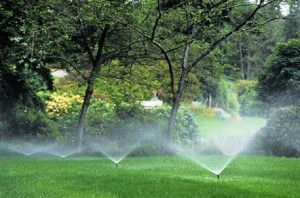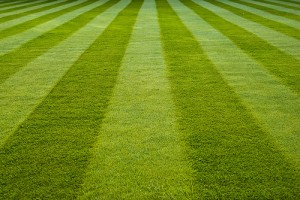Smart irrigation and mowing…while reading the title of this blog you might ask yourself, ‘well, what is stupid irrigation?’ Stupid irrigation is a watering regimen that contains no logical horticultural sense or understanding of plant and soil needs. Therefore, smart irrigation would be a watering regimen that considers time of day, actual water needs of plants and the soil, and current activities planned for a particular day or time of day. 
What time of day should I water? Manual watering of plants other than turf can be accomplished anytime during the day as long as overhead irrigation is avoided. Overhead irrigation, whether accomplished manually or with an automatic irrigation system, should be performed in the early morning so that plant leaves dry out before the direct rays of the sun bear down on them. Avoid watering in the early evening or at night because these practices create ideal conditions for fungal diseases to develop.
How do soil and plant requirements dictate proper irrigation techniques? Not all plants require the same amount of water or frequency of watering. Plants with the same water needs should be grouped together. For instance, an ornamental blue fescue requires little water compared to a hydrangea, so, it would be smart to plant these two plants in different areas. Too much water will kill fescue and too little water will cause a hydrangea to wilt heavily and possibly die. Soil types also indicate how much water is needed. Water percolates very quickly through sandy soils, so, watering in sandy soils requires more volume and greater frequency. Clay soils, on the other hand, have very tight particles and have the ability to hold water for longer periods of time. Also, since clay soils are so dense, heavy watering can cause runoff resulting in water being wasted. When irrigating areas of clay soils irrigation duration should be shorter and frequency of watering should be more intense.
What activities dictate the proper use of irrigation? Obviously, any outdoor activity within an irrigation zone is best enjoyed without participants becoming soaking wet due to sprinklers in use, unless, of course, it happens to be a water party. So, make sure automatic systems are programmed to run on days when parties, landscape work, and the like are not scheduled.
So, how does smart irrigation and mowing go hand in hand? Don’t ever mow the lawn when the grass it wet. Schedule watering regimens to occur on days when mowing will not occur. Mowing wet grass can exacerbate fungal disease problems in the turf, can cause a poor looking cut, can dull mower blades quickly, and possibly create ruts in the yard.
Finally, how much irrigation is smart irrigation? Under normal weather conditions (what is normal anymore?) plants generally require one inch of irrigation per week. This is exceedingly general and really doesn’t sound too smart. The best test to gauge how much water to throw at plants is the ‘look and see’ test. That means, look at the condition of plants. Are the leaves perky and growing? Is there any wilting going on? Are plants rotting in the mulch? Also, examine the soil. Are there huge cracks in the soil? Is it muddy outside? Is it raining really hard? What are the current weather patterns like? Feel the soil with your hands and determine if irrigation is needed.
Too many homeowners perform ‘stupid irrigation’ and have poor lawn mowing procedures. They turn on the systems and walk away. Their mowing contractor, or they, mow whenever it’s convenient and often mow too short. Automatic irrigation systems make life easier, but, they require constant attention. Heads always break or go out of adjustment. Timers can malfunction. Pipes can experience leaks and breaks. Automatic rain sensors sometimes perform unreliably. Valves can malfunction. Due diligence is needed. It’s not rocket science, simply, common sense. If one really enjoys the outdoors and the garden, and is observant, smart irrigation and mowing are easy tasks. If you ever have questions regarding your irrigation system or mowing techniques, please give us a call and we’ll help you through.
